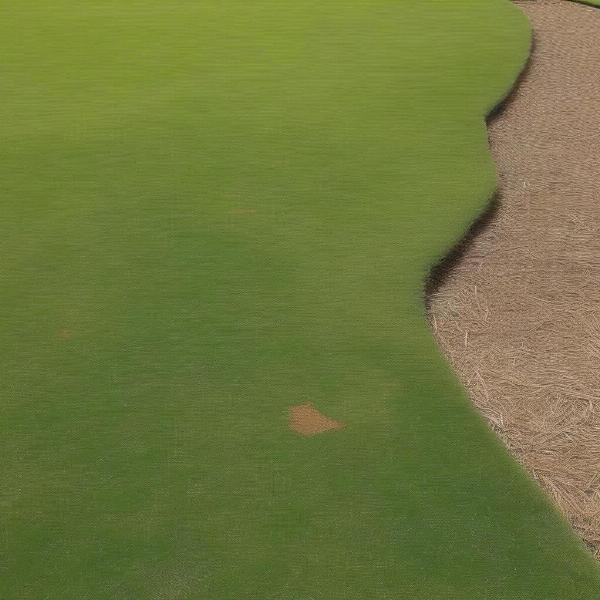Dog pee can be a real nuisance for lawn lovers. Those unsightly brown patches are a common problem for dog owners. This comprehensive guide will explore the causes of dog urine damage, offer practical solutions for dog pee lawn repair, and provide preventative measures to keep your lawn lush and green.
Understanding the Problem: Why Does Dog Urine Kill Grass?
Dog urine contains nitrogen, which in high concentrations, acts as a fertilizer burn. This concentrated nitrogen overload scorches the grass, creating those tell-tale brown spots. The salts in dog urine also contribute to dehydration, further damaging the lawn.  Dog pee causing brown patches on a lawn
Dog pee causing brown patches on a lawn
Effective Dog Pee Lawn Repair Strategies
So, how do you fix those unsightly patches? Several methods can help you repair your lawn and restore its vibrant green color.
Flushing the Affected Area
One of the simplest and most effective methods is to immediately flush the area with water after your dog urinates. Diluting the urine helps minimize the concentration of nitrogen and salts, preventing or lessening the damage.
Applying a Neutralizing Agent
Several products are specifically designed to neutralize dog urine’s damaging effects. These products often contain gypsum or other soil amendments that help balance the pH and reduce salt buildup. You can find these products at most garden centers or pet supply stores.
Reseeding or Resodding
For severe damage, you may need to reseed or resod the affected area. Prepare the soil by removing the dead grass and adding topsoil. Choose a grass variety that is more resistant to urine damage, such as fescue or ryegrass. lawn repair dog pee
Preventing Future Damage: Proactive Measures
Preventing dog urine damage is easier than repairing it. Here are some proactive steps you can take:
Dietary Changes
Adjusting your dog’s diet can sometimes help reduce the nitrogen concentration in their urine. Consult with your veterinarian about appropriate dietary changes. Adding a dog lawn supplement to your dog’s water can also help.
Designated Potty Area
Train your dog to urinate in a designated area of your yard, preferably one that is not heavily trafficked or easily visible. You can cover this area with mulch, gravel, or dog-friendly artificial turf. lawn spray for dog urine
Watering Your Lawn Regularly
Keeping your lawn well-hydrated helps it withstand the effects of dog urine. Water deeply and infrequently to encourage strong root growth. dog pee grass saver
Choosing Urine-Resistant Plants
Consider incorporating urine-resistant plants into your landscaping. Hardy groundcovers, ferns, and certain shrubs are more tolerant of dog urine than delicate grasses. plants that are dog urine resistant
Dog-Friendly Landscaping: Creating a Harmonious Outdoor Space
Creating a dog-friendly landscape involves combining practical solutions with aesthetic appeal. By selecting durable plants and incorporating designated potty areas, you can create a beautiful outdoor space that both you and your furry friend can enjoy. dog fence trencher
Conclusion
Dealing with dog pee spots doesn’t have to be a constant battle. By understanding the causes of the damage and implementing these dog pee lawn repair strategies and preventative measures, you can maintain a healthy and vibrant lawn while still enjoying the companionship of your canine companion.
FAQ
- Why are some areas of my lawn more affected by dog urine than others? The concentration of nitrogen in dog urine can vary, as can the sensitivity of different grass types.
- Can I use household products like baking soda to neutralize dog urine? While some people claim success with this method, it can also alter the soil pH and potentially harm your lawn.
- How often should I water my lawn to prevent urine damage? Watering deeply once or twice a week is generally sufficient, but adjust based on your climate and soil type.
- What are some good dog-friendly groundcover options? Clover, thyme, and creeping Jenny are all relatively tolerant of dog urine.
- Is artificial turf a good option for dog owners? Artificial turf can be a low-maintenance and urine-resistant alternative to natural grass.
- How can I train my dog to use a designated potty area? Positive reinforcement, consistency, and patience are key to successful potty training.
- What should I do if my dog continues to urinate on the same spot despite my efforts? Consult with a professional dog trainer or veterinarian for personalized advice.
About ILM Dog
ILM Dog is your go-to resource for expert advice on all aspects of dog care, from breed selection and puppy care to senior dog health and training tips. We provide practical, reliable information to help you navigate the joys and challenges of dog ownership. We cover a wide range of topics including dog breeds and selection, health and medical care, training and behavior, nutrition and feeding, grooming, products, and accessories. Contact us for expert advice: Email: [email protected], Phone: +44 20-3965-8624.